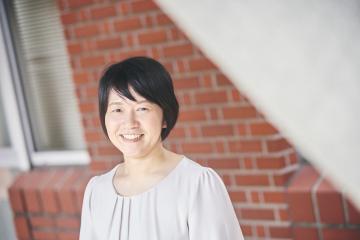“Human Encounters” from a Social Psychological Perspective—Focusing on Matchmaking Events and Dating Apps
Our society is built on various interpersonal relationships. Professor Kito conducts research from a social psychological perspective on the psychological and behavioral mechanisms underlying close interpersonal relationships, such as romantic relationships and friendships, and how culture and social environment influence these dynamics. In recent years, she has focused particularly on Japan’s declining marriage rates and delayed marriages, dedicating her efforts to empirical research on matchmaking events and dating apps that examine individual characteristics and behaviors.


Mie Kito
Professor, Department of Sociology, Faculty of Sociology & Social Work
Graduated with Honors from Department of Psychology, California State University, Chico. Completed doctoral program in Social and Personality Psychology, Department of Psychology, University of Manitoba. Ph.D. (Psychology). Previously served as a JSPS Postdoctoral Fellow and as Assistant Professor and Associate Professor in the Department of Sociology, Faculty of Sociology & Social Work at Meiji Gakuin University, before assuming her current position in April 2025. Her specialty is social psychology. Author of "The Social Psychology of Connection: Understanding the 'Atmosphere' that Surrounds People" (Koubundou, 2023), among other works.
The Japanese Context That Makes Romantic Relationships Difficult to Study
Japan’s declining birthrate has become a major social issue. Particularly in Japan, where children born outside of marriage are relatively rare, one underlying factor thought to contribute to this trend is the increase in people remaining unmarried and marrying later in life. Whether to marry is, of course, an individual choice and shouldn’t be imposed by society or others. However, it has also become clear that many people remain single not by choice, but because despite wanting to marry, they can’t find a “suitable” partner. Seeking to understand why this phenomenon occurs in Japan and to investigate its causes and potential solutions, I began researching matchmaking activities and dating apps.
Initially, I conducted research at a graduate school in Canada on what constitutes good interpersonal relationships and what factors predict healthy relationship dynamics. After returning to Japan, as I began studying romantic relationships as one of my research topics, I found myself struggling with the difficulty of accessing and surveying people who were in romantic relationships. While 60–70% of single people in North America have romantic partners, this figure remains at only about 30% in Japan, and this disparity was the primary challenge. Reflecting on my experience studying abroad, I recalled that in the United States and Canada, friends would casually meet and date potential romantic partners through matching services, but when I returned to Japan in 2012, I rarely heard such stories (though this has been changing in recent years, particularly among people in their 20s and 30s). When examining whether people without romantic partners don’t wish to marry, I found that this wasn’t necessarily the case—many wanted to marry, but lacked opportunities to meet someone and were unsure of what to do. I came to believe it was important to examine this situation in Japan from the perspectives of both the individual and the environment, considering the roles of individual psychology and behavior, as well as the influences of culture and social factors.

Individual Characteristics That Influence Encounters in Matchmaking Activities
In the past, arranged marriages and workplace romances were the norm in Japan. However, times have changed, and in recent years, an increasing number of people are using various matchmaking services for konkatsu [marriage-seeking activities]. A 2024 survey conducted by the Children and Families Agency made headlines when 25% of married individuals who had wed within the past five years reported meeting their spouse through dating apps. The venues for meeting potential partners are becoming increasingly diverse each year, with not only companies but also local governments organizing matchmaking events. Currently, I am conducting research on people’s psychology and behavior in various meeting venues, focusing particularly on factors that promote encounters with partners and the formation and maintenance of romantic relationships.
Under this research theme, I have conducted quantitative studies through questionnaire studies and experiments on 1) the relationship between one’s physical attractiveness or personality traits and evaluations from others at matchmaking events, 2) the relationship between individual characteristics and dating app usage experience or motivation, and 3) the usefulness of the metaverse in marriage support services.
Among these studies, in empirical research on matchmaking events, I had single men and women engage in three-minute conversations after first measuring their personality traits, attitudes toward romance, social status, educational background, and other factors. After the conversations, I asked how attractive they found their conversation partner and how much they would like to pursue a romantic relationship with them. The results showed that women with higher physical attractiveness and educational levels were evaluated as more attractive by men. On the other hand, no correlation was found between men’s attraction ratings and personality traits, and no factors on the men’s side were identified that were clearly related to women’s attraction ratings. Empirical research on matchmaking events in Japan is still in its early stages, and I believe it needs to continue in the future.
I am also putting effort into collaboration and support with practitioners in the field, including a partnership agreement with the marriage support services provided by the Honjo City Council of Social Welfare in Saitama Prefecture, and participation in the advisory board of Enito Group Inc., which operates dating apps. Once I began these collaborations, I saw that the staff at both organizations were working seriously and with a passionate commitment. I hope to support these individuals through academic advice and other means, and to give back to the field the insights gained from my research.

Participatory Classes to Foster People Who Can “Use” Social Psychology
I currently teach Social Psychology and Interpersonal Relationships as undergraduate lecture courses. Although nearly 200 students enroll each year, I assign in-class activities that require student participation every session. To ensure that their time isn’t spent simply listening to lectures, I have students respond to psychological scales related to concepts covered in class, compile the results on the spot, compare those results with previous research, and engage in group discussions applying theories explained in class to everyday life examples. By doing this, students become able to think about how the course content relates to their own lives. These courses cover numerous topics familiar to students, and related phenomena are prevalent in their daily lives and work. Through thinking for themselves in class and making the learning their own, I hope they will become people who can effectively “use” social psychology even after graduation.
In my lab, I respect my students’ autonomy. For graduation thesis topics, I generally accept any theme that relates to social psychology or interpersonal relationships and can be studied through quantitative research methods. Of course, typical themes like friendships and romantic relationships are welcome, but recently, more students are choosing topics related to dating apps or communication and impression formation in the context of social media. Particularly common are themes related to students’ own hobbies or oshi [favorite celebrities]. While I think this is a research area that students find naturally engaging, writing seminar papers and graduation theses in my lab requires reading English literature and conducting statistical analyses that many humanities students struggle with, so among students, it’s known as a difficult lab for the unmotivated. But I want students in my lab to acquire basic skills in social research and psychological experiments, and to experience the excitement of researching and solving mysteries about things they find puzzling.
In my Practical Training in Social Research, where students conduct fieldwork to collect and analyze data, I have conducted surveys alongside students on topics such as dating apps, and several results have emerged that even I find interesting. For example, in a cross-cultural study of dating apps between Japan and the United States, we found striking differences in users’ profile photos. Although we couldn’t collect a large number of photos, many Japanese users had photos where they weren’t visible at all, and even when they appeared in photos, many showed profiles or backs where faces were difficult to see. In contrast, Americans mostly had photos taken straight-on like ID photos, which surprised my students. They said things like, “If we uploaded photos like that, people would think we’re narcissists.” It would be fascinating to investigate and analyze the reasons behind such differences.
Also memorable was an experiment conducted in my lab investigating the effects of “enhancing” one’s attractiveness. When we compared situations where someone originally rated at 60 points made themselves appear to be a 90 versus showed themselves as they truly were at 60, the results showed that revealing oneself authentically created a better impression, while enhancement actually worsened the impression. This finding surprised even me. Recent students seem to think that a little enhancement is acceptable, but this may have delivered the message that “it’s better to show your authentic self”.

Expectations for Creating Meeting Venues Suited to Individual Characteristics
Japan’s declining birthrate and increasing rates of unmarried individuals are important themes that are already being widely addressed in fields such as sociology. While such research is conducted from a perspective that surveys Japanese society as a whole, research from a social psychological perspective that also focuses on individual behavior and psychology is equally important.
For example, the causes of increasing unmarried rates and delayed marriage are often attributed to the increase in non-regular employment among men and the resulting income instability, as well as increased employment rates among women. However, solving these social and economic factors would likely not completely resolve the issues of remaining unmarried and delayed marriage. While employment status and income stability are undoubtedly major factors, by also examining individual characteristics of single people and behaviors such as how to act in first-meeting situations, we may be able to provide opportunities and hints to people who hope to marry but “don’t know what to do,” potentially offering new approaches to addressing unmarried and delayed marriage trends.
Furthermore, while the rise of matchmaking events and dating apps has diversified venues for encounters that lead to marriage, this diversification has also created new challenges: many people are unsure which services will suit them or experience choice overload. When individuals try services randomly and continue to have unsuccessful experiences, some may lose motivation due to “matchmaking fatigue” or “app fatigue.” However, if we could scientifically propose meeting venues based on each person’s characteristics, we could help prevent matchmaking fatigue and loss of confidence caused by using unsuitable meeting venues, thereby supporting sustained matchmaking efforts.
Working to curb unmarried rates and delayed marriage can potentially contribute to solving broader social problems, such as population decline and the prevention of loneliness and isolation. Research on encounters through matchmaking activities is thus an attractive field with significant practical applications. Through future research, I hope to dedicate my efforts to supporting individuals who wish to marry in finding partners with confidence at meeting venues tailored to their characteristics, ultimately leading to meaningful relationship development.

